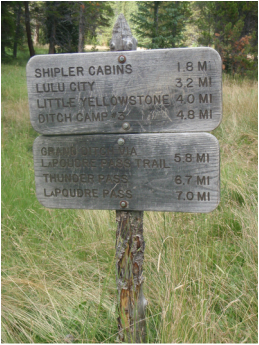 Fall back with your hands before or behind you just so. Joshua Marie Wilkinson, The Dogs The unexpected. As humans, our fears are realized when the unexpected comes along and kicks our legs out from under us. On Labor Day I was hiking in Rocky Mountain National Park with my husband, Mike. We were discussing my desire to hike California's John Muir Trail solo, when I tripped on a rock. I landed flat on my forearms, as Mike said, Like a book falling over. Once I caught my breath, we finished hiking to our car, laughing the entire way back at my clumsiness, me making a mental list of who might accompany me on the John Muir hike. The next morning I was in the ER having my left arm immobilized due to a fracture in the radial head, next to the elbow. Quickly I realized how dependent I am on using both arms together, and how frustrating it is to do the simplest of actions, like buttoning my jeans or folding a towel. What I took for granted, is now difficult, like typing . . . The irony of the entire event is that Monday was the best day I've had since moving to Colorado. I was finally hiking in a gorgeous setting, feeling strong and invincible, making plans for next year. And then there I was, literally laid out flat. Life. On the upside, I have cable TV and a Kindle that works with one hand, and I definitely have the time and opportunity to edit and complete the chapbook I'm working on. Yet, maybe this is not a time for distracting myself, but for listening. As autumn finally whispers her seductive promise of cooler weather, I am listening to her subtle messages: stay put, look around you, feel the breeze on your skin, don't take anything for granted. And, one more unexpected utterance: look for those yellow legal pads, because you'll be writing your poems in long-hand. http://www.poets.org/viewmedia.php/prmMID/21981
0 Comments
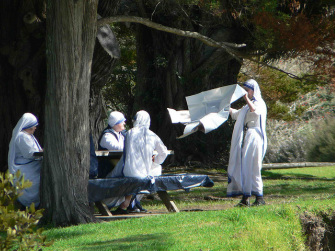 This week I've been struggling with sight. Or the lack thereof. It seems the drier Denver air and a fan going 24/7 has created dry eyes. I'd heard of it, but never experienced it, so I went to my doctor, the ER, and finally an ophthalmologist before finding the cause of my blurred vision. Despite the blurriness, I took a long walk around Sloan's Lake in hopes of shaking out some of my frustration. Sitting at a picnic table were ten nuns dressed from head to toe in white. The juxtaposition of formality and leisure captivated me; the word, beautiful, came to mind. Unfortunately I'd left my camera with its telephoto lens at home, and missed the opportunity to save the image. The above photo is not mine, but gives you an idea of what I saw. And this brings me to what we take in as poets, how we enter our own poems. I could have been taken in by the seagulls on the lake, or the lone cormorant hoarding his pier post, or the guy jogging shirtless with three dogs on leashes, but it was this vision of women clustered around a table, that thrilled me. How do you enter your poems? Through vision or sound or taste? Or feeling? I do not usually begin a poem with an image. Feelings are my way into poetry. Of course I thrash around looking for something that works as metaphor for the feeling, but usually the image is secondary. I may be an exception. I'm hyper-aware of visual stimuli now. And it's brought me to a new awareness of how precious sight is. And how fragile these bodies are. Ultimately this foray into my visual neverland has humbled me. And it makes me want to write more, see more, take in more. Maybe even feel more. Right now a crow is squawking out my window. I am tempted to enter a poem through her. I think in a previous life I was a crow. I just get them. All of that annoying chatter, picking up things that don't belong to them, an obsession with nests. It just fits. I digress. So yes, we enter our poems as we live (or lived), and for me, even through the blurriness has brought vision to the forefront of my perception, I'm going to keep feeling my way into my poems, and occasionally I'll enter one through a bird clamoring outside my window . . . There Is Always a Bird, It is Always a Crow In my house of dreams, perpetual flight, not the brazen lift of predator, more scavenger looking down over humans. It has always been like this, measured thought before action, when someone offers themselves, the crow inside builds a nest of wire and sticks, feathers stolen from other birds, makes a home from everything discarded. 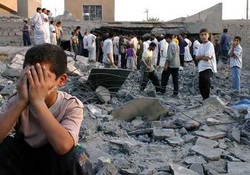 Dozens of people killed in Syria, 32 of them children. And we in America are scandalized, horrified, naming the deaths barbaric, a crime against humanity. What we aren't considering is our part in the world's suffering.
There were 4,487 US military fatalities during the war in Iraq. We have to search to find out how many fatalities the allied forces have suffered. And how many civilians were killed in a war that we brought to a country that had not attacked us, and who was not an imminent threat to our security. 106,765-116,627, is the estimate given for civilian deaths in Iraq due to our 2003 invasion. Add to these the number of both military troops and civilians who were injured or maimed, and the sobering fact that every 80 minutes a veteran of either Iraq or Afghanistan commits suicide. Every 80 minutes. Our war dead are not all slayed on the battlefield. Having a husband who retired from the Air Force, having moved from home to home, from state to state in support of his career, having raised five children in military housing, having stood in a make-shift military chapel with a military chaplain chanting the Liturgy, having a son who served in the Army, I know what the commitment to country means. I know what sacrifice means, and I do not take either lightly. On this Memorial Day, I suspect the ultimate sacrifice of our war dead is being whitewashed by a half-asleep American population who will watch endless car races, grill hamburgers, boat, swim and water ski, and gather less in memory of our dead, than in celebration of having a day off from work. And what does war have to do with writing poetry? Everything. If we write as a means to understand our actions, our desires, our hatreds as well as our loves, then poetry and war go hand in hand. The most vulnerable, most disturbing, the most revealing poetry is written when someone knows his or her life is in danger. Here, there is no hiding. In both Here, Bullet and Phantom Noise, Brian Turner gives us a first-hand look at the war in Iraq. A soldier’s view, as well as a poet’s. ASHBAH by Brian Turner The ghosts of American soldiers wander the streets of Bagdad by night, unsure of their way home, exhausted, the desert wind blowing trash down the narrow alleys as a voice sounds from the minaret, a soulful call reminding them how alone they are, how lost. And the Iraqi dead, they watch in silence from rooftops as date palms line the shore in silhouette, leaning toward Mecca when the dawn wind blows. from Here, Bullet http://www.amazon.com/gp/product/1882295552/ref=kinw_rke_rti_1 If I can separate the suspicious war of a misguided president from the men and women who served in it, if I can give more than lip-service to supporting the military here and overseas, I can open further to invite these men and women into my quiet, bookish world of poetry. Poetry has saved me more than once, possibly it can save them. On this Memorial Day I am reawakened to what war is, and the too-high price paid for an ill-considered war. If the fallen could speak to us from their graves, I imagine they'd remind us that our hands are stained with innocent blood too, that Syria and America are not as far apart as we like to believe, and that all violence comes from the same source. But even if they could speak, would we hear them? Approaching the Delta by Colette Jonopulos We shall find peace. We shall hear angels. We shall see the sky sparkling with diamonds. —Anton Chekov I want to be there when mourning doves glide above the river, downstream where leaves and branches snare on rocks, where deer hesitate to go further. I want to be there when this war ends, and the next, where under cover of trees we touch the wind with our nakedness. When there are no words left, only emptiness angular with hope, I want to be there. The rush of us, dense thighs and arms entwined, the world grown dark, water the only continual. Bodies buried nameless, the quiet after; the named restless still. I want to be there, near the crookneck, where water eddies, glides past in spirals, like the fingerprints of those gone, left to memory and statistics, their voices snagged in branches overhead, speaking little of fallen matter, but of water carried downstream with remnants of winter, of the swift lure of salt right before the river becomes something else. Anyone remotely awake recognizes that we are in a world of hurt.
I've traversed the different philosophies, the political firestorms, the wars we humans are determined to engage in, traced them with a finger driven by compassion. Still, no matter what issue I bring to the forefront, it seems the opposites emerge as a driving factor. The opposites we've accepted as inevitable, if not inherent aspects of our humanity. In recent years I've come to believe otherwise. There is a place, a wide plane of openness that has little to do with judgment, or choosing, or opposites. It just is, which means we are fundamentally just us, just here, just now. This openness leaves no room for competition, for one-upmanship, for ego-driven living. But are we ready to enter the field of non-duality? Are we mature enough as a species to just be where we are without complaining, grasping, competing? What does our world look like without The Voice or Chopped? Without MSNBC or FOX? Without outwit, outlast, outplay? Can we stop pitting one human against another, one political agenda against another? Can two candidates be equally viable choices, or must we demonize one to uphold the other? In writing, we find this same choice, competitiveness or expansive acceptance. Do we write to compete with our neighbor? Do we rack up acceptances? Do we wince each time someone else has a financial or artistic success? Can we imagine a literary world big enough for all of us? The Internet has leveled the literary playing field. Our work can be out there with little forethought or effort. But the flip side is that we now have hundreds of MFA programs, and a new kind of pecking order. The game is played out again, but with new rules and new players. We can't seem to leave things alone, when there is a void we fill it with still another competitive venue. No wonder so many writers become discouraged. I co-edit and publish a (very) small press journal. I read hundreds of poems yearly, some from new writers afraid to lick the envelope shut, some typed on typewriters, some written in prisons. We are mailed envelopes filled with broken marriages, first loves, secret temptations, and endless observations. We choose one poem over another and feel bad for the one we did not choose. Non-duality does not mean a poorly-written poem is equal to a well-written one. It means we are in a liminal time in history, a shifting time, where the need to compete is less important than the need to agree, to discover common ground, where the need to communicate trumps the need to win out over someone else. Even if a poem isn't chosen, it is just as viable as one that is. If we can let go, even for a moment, of the competitive urge, what will our writing look like? How many more poets will be born when writing is simply writing for the joy of it? And will the writing itself become more positive, more life-affirming, if it is written from a place of collective acceptance, instead of from the place of literary criticism? Recently, I visited a poetry-only bookstore in Boulder, CO. A college student was sitting on a bar stool at a skinny wooden bar facing the street. His notebook was filling with lines of writing and he was lost in his own creation. I thought how good it feels to be in that place, to be oblivious to your surroundings, to not hear human voices, or notice that the sun is setting. In that place, there is no duality, no wrong, no right, and absolutely no one to compete with. Put down the weight of your aloneness and ease into
the conversation. The kettle is singing even as it pours you a drink, the cooking pots have left their arrogant aloofness and seen the good in you at last. All the birds and creatures of the world are unutterably themselves. Everything is waiting for you. -- David Whyte from Everything is Waiting for You ©2003 Many Rivers Press I have been trying to locate a niggling dissatisfaction, an impression that until this morning continued to elude me. Finally, on Easter, it arrives in its fullness. I am distracted. We are all distracted. While walking past a local bar and grill yesterday, I observed a woman texting, while her companion quietly ate his lunch. Not only was she ignoring him, she seemed disconnected from the outdoor setting. What or who was more important that the person across the table from her? With each distraction, each superficial activity, we are erasing our depth. Instead of asking the difficult questions, we are becoming sated at the level of entertaining or being entertained. We imagine this is communication, but it is mostly a way to skate across the surface of life. It is spring and I worry that an entire generation is missing the clues, the visceral beauty of something bursting from the dirt, a purple tulip or yellow daffodil. Are they noticing insects or naming local birds? Are they learning from that gut-wrenching place of needing to know, or instead acquiring knowledge as a commodity? If we put our androids and our ieverythings aside for a day, what would we notice? The crow dipping overhead, the smell of blossoms come too early, the wind on our skin, each other? We might recognize the face across the table from us; intuit a need or a sorrow. Our conversations would be rawer. Our vulnerability would spike. Our words would be richer. We would allow for the open space necessary for creativity to germinate. Everything is waiting for you. Perhaps, being lost, one should get loster.
--Saul Bellow I have been reading a book that compares map making to writing. The book's author, Peter Turchi, writes about negative space, how what isn't on the page tells us as much as what is. Looking at it from this angle, negative space is actually positive. All of that white around my words is not empty, thoughtless space, but valuable space the reader will fill with his or her own imagery and emotion. The author has made me reconsider my prose style, how writing in short bursts, much like writing poetry, is not asking too much of the reader. The reader will follow me as I leap from image to image, from scene to scene. Like a good relationship, one where words are not necessary, where silence is as full as any conversation, a well-written poem or book is intuited as much as read. As writers, do we trust this white space, the blank page, the chapter that turns out to be a paragraph? When a poem looks odd on the page, when it looks like it belongs to someone else, do we allow it its voice or do we shape it into something familiar? I may be wrong, but this seems to be about trust. Trust in ourselves, in our ability to communicate, not only as writer or cartographer, but as human animal. And trust in our readers who are willing and able to make the leaps, fill in the intentional or unintentional gaps, and follow us with full confidence. The quote above, the totally terrifying idea of being lost and getting loster, gives us permission to follow our hearts, our peculiar ideologies, into the unknown. We want answers; we want things explained to us so we know what’s expected of us. We want that blank page covered with detailed instructions! We want, quite literally, a map. And when the map is not forthcoming, we become Saul Bellow's loster. We frequently place our trust in something or in someone to show us valleys and mountain trails, to direct us to the drinking water, to ultimately be our Virgil. How surprising to find that we are alone in this; we are the map makers and our maps, no matter how hard we labor, no matter how beautiful they appear, are never complete. And in their incompleteness, is an almost incomprehensible freedom to create something never before imagined. www.peterturchi.com “Whoever reaches into a rosebush may seize a handful of flowers; but no matter how many one holds, it's only a small portion of the whole. Nevertheless, a handful is enough to experience the nature of the flowers. Only if we refuse to reach into the bush, because we can't possibly seize all the flowers at once, or if we spread out our handful of roses as if it were the whole of the bush itself -- only then does it bloom apart from us, unknown to us, and we are left alone.” ― Lou Andreas-Salomé The Poetry of Rilke, translated and edited by Edward Snow, is one of the books I brought with me in my recent move from Eugene. We have a very tall storage unit in Eugene, where most of my books are currently stored in boxes. As I packed those boxes, I considered the endless volumes of poetry, the Jungian psychology, and the hiking and nature books, and left most of them behind. What I brought was anything Asian-influenced, my haiku and haibun books, and a gift, The Penguin Anthology of 20th Century American Poetry. Another gift, Federico Garcia Lorca, Collected Poems, and The Poetry of Rilke. These two books, because no matter where I travel, I want Lorca and Rilke nearby. They are a particular comfort. Rilke, no angel, is my idea of an adult that lived out his spiritual ambiguity with grace. At no point was he wanting to be pious, but in his honest questioning, he tapped into that place of wonder we begin burying as soon as we are embarrassed by our vulnerabilities. I think of it as layering, as intellectualizing, as creating a wall between what our hearts tell us we need and our minds and culture tell us we don't. As we become responsible, mature adults, we learn how to fit in, we learn to compromise. And then eventually, if we're very fortunate, we begin to unlearn, to unravel. And maybe by the time we breathe our last breath, we are fully ourselves. Rilke was. Lorca was. Lou Andreas-Salome, Rilke's lover, definitely was. I carry Rilke's works with me, because so often I choose to turn away, to close myself off. As Andreas-Salome wrote, . . . "a handful is enough to experience the nature of the flowers." If I can just open the book's cover, skim a few lines, read a few poems, I am gently brought back to myself. To Lou Andreas-Salome -by Rainer Maria Rilke I held myself too open, I forgot that outside not just things exist and animals fully at ease in themselves, whose eyes reach from their lives' roundedness no differently than portraits do from frames; forgot that I with all I did incessantly crammed looks into myself; looks, opinion, curiosity. Who knows: perhaps eyes form in space and look on everywhere. Ah, only plunged toward you does my face cease being on display, grows into you and twines on darkly, endlessly, into your sheltered heart. As one puts a handkerchief before pent-in-breath- no: as one presses it against a wound out of which the whole of life, in a single gush, wants to stream, I held you to me: I saw you turn red from me. How could anyone express what took place between us? We made up for everything there was never time for. I matured strangely in every impulse of unperformed youth, and you, love, had wildest childhood over my heart. Memory won't suffice here: from those moments there must be layers of pure existence on my being's floor, a precipitate from that immensely overfilled solution. For I don't think back; all that I am stirs me because of you. I don't invent you at sadly cooled-off places from which you've gone away; even your not being there is warm with you and more real and more than a privation. Longing leads out too often into vagueness. Why should I cast myself, when, for all I know, your influence falls on me, gently, like moonlight on a window seat. Translated by A. Poulin 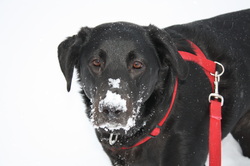 Two months in Denver, an entirely different environment. We bought a tall bottle of aloe lotion for our dry skin, we drink more water than usual, and we bundle up against the harsh winds with myriad-colored gloves and scarves.
Two months and Bailey is thriving! She leaps through the snow, her two-year-old puppy self perfectly happy as long as she's in motion! She's my example of adaptation. I watch her enthusiasm, unbound, immediate. Earlier while writing an email, I typed god instead of dog, and I am wondering how close I came to an unspoken suspicion. To forgive all manner of slights, to keep going no matter what you've been through, to leap into the unknown, these are holy qualities. Two months of working, not writing. And now the freedom to write and the necessary silence all around me. It is going to take time to accept I really do have the time to ponder, to imagine, to expand my ideas outward. I think of writing residencies, how we all want that month to retreat into an atmosphere that expects little of us. But even this, especially this, the early morning quiet, the black dog at my side, the opportunity to make lists and jot down silenced dreams . . . this is more than I expected. And I am grateful. Recently relocated to Denver. A move that is still moving, everything feels temporary and unfamiliar. The soup a lot of poets would like to find themselves in, the ever-changing circumstances fodder for any writer.
But I’m finding instead of writing, I’m keeping up, hanging on, trying to dig my heels in to slow down the forward motion of my life. And it isn’t working, so I’ll have to create from this place of uncertainty. If you believe place doesn’t matter, read your own work. If you live near water, your poetry is wet, slippery even. If you live where it’s hot and dry, your images reflect this aridity. At least mine do. I’ve moved from a wet Oregon climate to a very dry plains climate. I love looking toward the west, the snow-covered Rockies looming, and then I think of further west, the coast where I’ve hiked and walked, all the things I love and dislike about being in a lush watery climate. Our poetry tells on us. We cannot escape place. We are influenced not only by people and work and the condition of our bodies, but by the larger environment. Writers, poets, creatives, are sensitive to the feel of the air, the scent rising from hot asphalt or the grasses of the plains. It seeps into us, gets under our skin, changes us. As I consider moving, movement, as I adjust to a new locale, I can’t know what I’ll write. I’ve written one complete poem this past month, revised it, reconsidered it. It is simple, nothing layered or particularly new, it speaks of endings and love, of letting go. Maybe I need to do the final edit and send it out, let go of it, allow it its own flight west or east, wherever it needs to go. Like me, taken by the wind, never quite sure where I’ll land.
Start blogging by creating a new post. You can edit or delete me by clicking under the comments. You can also customize your sidebar by dragging in elements from the top bar.
|
Archives
October 2022
AuthorMy writing often deals with the environment, my poetry filled with allusions to natural and man-made disasters. I have unlimited hope though; there is just too much wonder in this world to become a defeatist. To quote Margaret J. Wheatley, '"Hopelessness has surprised me with patience." Categories |
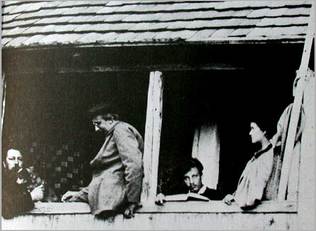
 RSS Feed
RSS Feed
